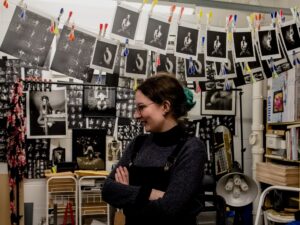“There is a need to ensure artists are recognised for all the time they put into commissions and other work.”
A fascinating process is underway in Ireland. The Basic Income for the Arts scheme has launched for applications from Irish creatives. The pilot has been likened to Universal Basic Income trials in other countries, but as the Irish government says, “This is a sectoral intervention to support practicing artists and creative arts workers to focus on their creative practice”.
All applicants who met the criteria, applications closed 12th of May, will be put into a random draw, where 2,000 winners will be paid 325 Euros a week for three years. Some of the unsuccessful applicants will be invited to form part of a control group (for which there is also some compensation) so that the impact of the policy can be assessed.
 Looking at the proposed data reporting and evaluation methods, the Irish Government is interested in measuring a range of potential outcomes, from wellbeing to earnings. The scheme aims to measure impacts in five main ways;
Looking at the proposed data reporting and evaluation methods, the Irish Government is interested in measuring a range of potential outcomes, from wellbeing to earnings. The scheme aims to measure impacts in five main ways;
- – Income stability
- – Career Viability
- – Sector Retention
- – Wellbeing
- – Recognition (that is of the important of the arts in Irish society)
The scheme is targeted at artists and creatives in the wider sense, i.e. including writers, musicians and performers as well as visual artists.
The idea of using Basic Income to support artists or other groups in society has been growing in popularity and has been boosted by the pandemic. It’s seen by many as an opportunity to ensure basic needs are covered, particularly in an age of increasing automation and fewer jobs.
It seems particularly relevant to artists and other careers where earnings are often irregular, lower than average and often boosted by other sources of income.
Of course, another angle on this is to ensure that artists are paid fairly for the work they do. As Fatoş Üstek reminds us in this recent piece for the Art Review, artistic practice goes beyond the “fantasy of the lone ‘genius’ artist: secluded in their studio”; there is a need to ensure artists are recognised for all the time they put into commissions and other work, including the fact that they may incur significant costs in applying for these roles in the first place.
The Artists Union of England has set out, for example, daily rates of pay for artists
Financial stability is one of our intended social outcomes. That is, we hope that our business model will provide financial stability to artists and studio providers by providing long-term space for affordable rents. But we recognise that our intervention cannot succeed in a vacuum and are keen to explore other ways we can help move the conversation forward on artist pay and income.

About the author
Jessica Slack, Finance Director, Creative Land Trust.
Jess builds and maintains models and scenarios for investment appraisals and long term financing, as well as managing all of the day-to-day financial responsibilities. Before joining Creative Land Trust, she had ten years’ senior finance management experience in both the private and the charity sector, following on from eight years prior experience in the public sector in a variety of financial management roles. As head of Finance and then Finance Director at St Aubyn Estates, she gained extensive experience in managing a mature property portfolio(c150 tenancies) within a small organisation and obtaining bank finance (short and medium term) to fund developments. Most recently she was Director of Finance and IT at Second Step, a Bristol-based mental health charity that provides supported housing on a not-for-profit basis. Jessica trained as a Chartered Accountant with the National Audit Office and is a Fellow of the Institute of Chartered Accountants of England and Wales.

